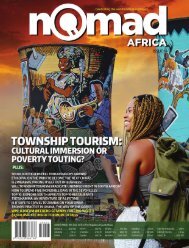Nomad_Africa_Edition12
Born from a passionate desire to dispel the negative perceptions which the world has held of the African Continent, and to replace it with a positive focus, Nomad Africa magazine celebrates life on the African continent. Covering stories from all countries and all cultures, it strives to include unique tourist attractions, business development, technology and investment opportunities as well as looking at the continent's cultural heritage. Nomad Africa inspires and breeds a conscious, knowledgeable generation of visionaries among our own, and influences positive perceptions and appreciation for the true worth of Africa worldwide.
Born from a passionate desire to dispel the negative perceptions which the world has held of the African Continent, and to replace it with a positive focus, Nomad Africa magazine celebrates life on the African continent. Covering stories from all countries and all cultures, it strives to include unique tourist attractions, business development, technology and investment opportunities as well as looking at the continent's cultural heritage. Nomad Africa inspires and breeds a conscious, knowledgeable generation of visionaries among our own, and influences positive perceptions and appreciation for the true worth of Africa worldwide.
Create successful ePaper yourself
Turn your PDF publications into a flip-book with our unique Google optimized e-Paper software.
KENNETH<br />
KAUNDA<br />
ZAMBIA’S FOUNDING FATHER<br />
Can you remember those old TV images of that flamboyant<br />
politician – the person who used to wave a white handkerchief, one of the<br />
key elements and an essential part of his attire at the time? Yes, it is one of <strong>Africa</strong>’s<br />
greatest politicians and liberators from colonial powers – Mr Kenneth<br />
David Kaunda of Zambia<br />
Words: DIETER GÖTTERT<br />
born on 28 April, 1924 in<br />
Lubwa, near Chinsali, in<br />
the then Northern<br />
Rhodesia and now part<br />
of Zambia, Kaunda’s father<br />
hailed from<br />
Malawi, formerly<br />
known as Nyasaland,<br />
and it was this legacy<br />
that would later become yet another challenge<br />
to Zambia’s first president after Britain<br />
had relinquished colonial power.<br />
Being the youngest of eight children, the<br />
young Kaunda, very much like other <strong>Africa</strong>ns<br />
who attained some form of middle-class status<br />
in colonial Zambia, went to the Munali<br />
Training Centre in Lusaka from 1941 – 1943.<br />
Following in his father’s footsteps, Kaunda<br />
taught at the Upper Primary School at<br />
Lubwa, followed by time spent, apart from<br />
being a teacher, a missionary, choirmaster<br />
and even leading a Pathfinder Scout Group.<br />
After 1943 and travelling from colonial Zambia,<br />
the young Kaunda spent further time as<br />
a teacher in Tanganyika – present day Tanzania.<br />
But it was upon his return to Zambia in<br />
1949 that his roots in politics started to grow<br />
when he became an interpreter and advisor<br />
on <strong>Africa</strong>n affairs to a liberal white immigrant<br />
and also member of the Northern Rhodesian<br />
Legislative Council, Sir Stewart Gore-<br />
Browne.<br />
As an astute and intelligent person, Kaunda<br />
acquired a wealth of political knowledge on<br />
how colonial governments worked, and<br />
learning vital and necessary skills that would<br />
bode very well when later that year, he<br />
joined the first significant anticolonial organisation<br />
in Northern Rhodesia, the <strong>Africa</strong>n National<br />
Congress (ANC).<br />
Bearing in mind that as one reflects and<br />
writes about these great sons of <strong>Africa</strong> years<br />
later, the trials and tribulations of such men<br />
were never easy. There were many pitfalls<br />
and failures that all great leaders encountered,<br />
for the path of a leader is never an<br />
easy one, and always requires enormous responsibility,<br />
sheer guts and determination.<br />
It is said that Kenneth Kaunda’s fate was<br />
sealed for the future to become one of<br />
<strong>Africa</strong>’s great politicians when he became<br />
the ANC’s Secretary-General in the 1950s –<br />
a role that ostensibly thrust him into being<br />
the chief organising officer of the movement<br />
and also brought him into close contact with<br />
rank and file members. This, in hindsight, was<br />
a key element when he formed a new organisation<br />
called the Zambia <strong>Africa</strong>n National<br />
Congress.<br />
Perhaps one can argue that this is where<br />
Zambia’s independence movement really<br />
started gaining significant momentum in<br />
terms of Kaunda fighting against the colonial<br />
powers, setting in motion a chain of events<br />
that would ultimately lead to Britain inviting<br />
Kenneth Kaunda and other leaders to the<br />
seat of colonial power in London for discussions<br />
on the three central <strong>Africa</strong>n colonies—<br />
Southern Rhodesia, Northern Rhodesia, and<br />
Nyasaland.<br />
POSITIVE NON-VIOLENT ACTION<br />
Going back and before those inevitable discussions<br />
with the British rulers became a reality,<br />
Kaunda had, as the leader of the new<br />
Zambia <strong>Africa</strong>n National Congress, skillfully<br />
hatched a militant policy against Britain’s<br />
plan for a federation of the three central<br />
<strong>Africa</strong>n colonies, Southern Rhodesia, Northern<br />
Rhodesia, and Nyasaland.<br />
With a real fear on the part of many <strong>Africa</strong>n<br />
62 | www.nomadafricamag.com | ...Celebrating the world’s richest continent | Issue 12





